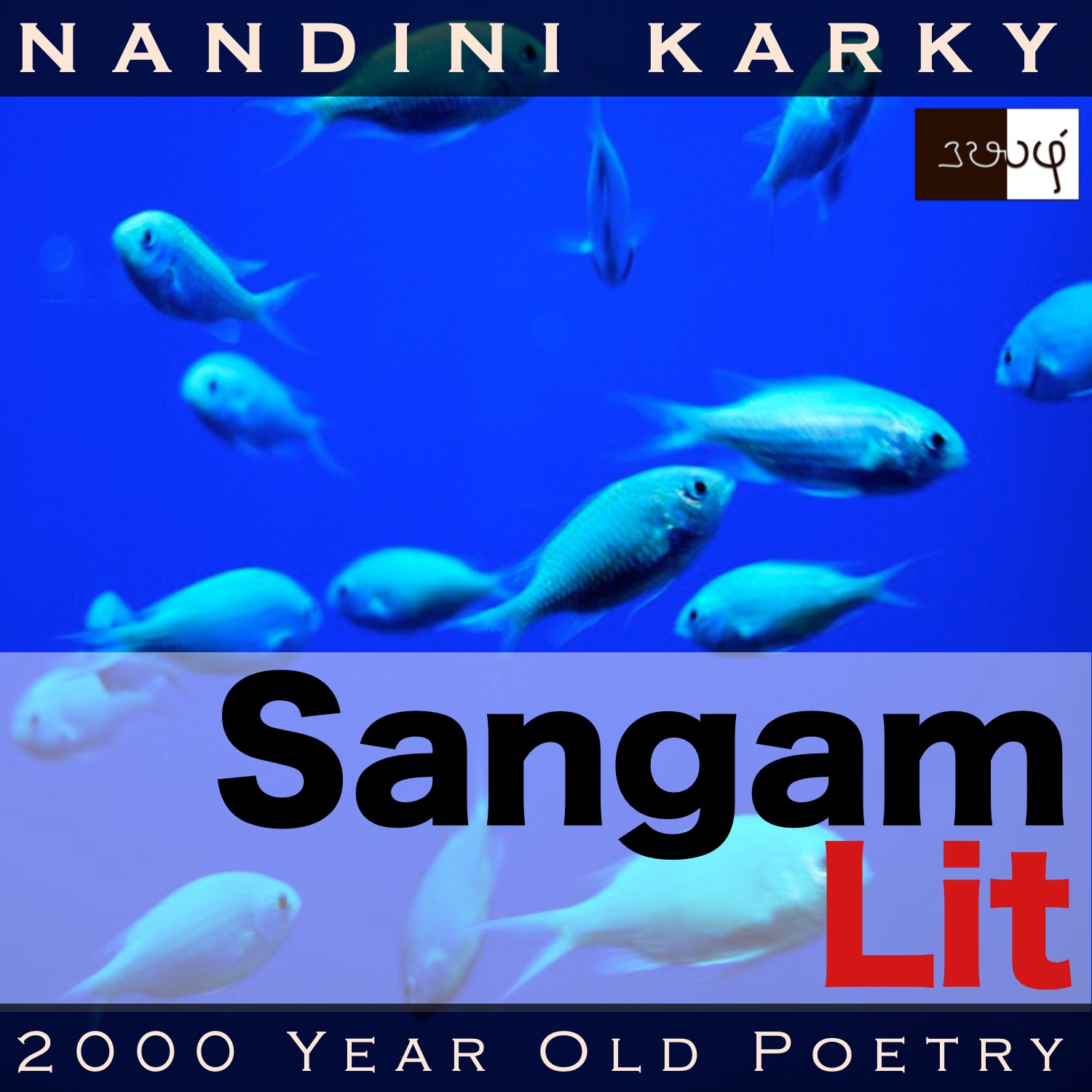Podcast: Play in new window | Download
Subscribe: Apple Podcasts | Spotify | Amazon Music | Android | iHeartRadio | TuneIn | RSS | More

In this episode, we relish the metaphorical delights in Sangam Literary work, Natrinai 63, written by Ulochanaar. Set in the ‘Neythal’ landscape or the coastal regions, it’s a lament in the voice of the lady’s confidante to the lady, passing on a hidden message to the man, listening nearby.
உரவுக் கடல் உழந்த பெரு வலைப்பரதவர்
மிகு மீன் உணக்கிய புது மணல் ஆங்கண்,
கல்லென் சேரிப் புலவற் புன்னை
விழவு நாறு விளங்கு இணர் அவிழ்ந்து உடன் கமழும்
அழுங்கல் ஊரோ அறன் இன்று; அதனால்,
அறன் இல் அன்னை அருங் கடிப் படுப்ப,
பசலை ஆகி விளிவதுகொல்லோ-
புள் உற ஒசிந்த பூ மயங்கு அள்ளல்
கழிச் சுரம் நிவக்கும் இருஞ் சிறை இவுளி
திரை தரு புணரியின் கழூஉம்
மலி திரைச் சேர்ப்பனொடு அமைந்த நம் தொடர்பே?
Although we have encountered the word ‘உரவு’ in many, previous ‘Neythal’ poems, this is the first time, I delved into it expansively. This far, I had considered it to only mean ‘vast and spreading’ as it has been used in association with the ocean. But today, I learnt that this word, the favourite Tamil adjective for the sea, has other meanings like ‘strength’ and ‘wisdom’ too. Anyone who has sat by the roaring shore and listened to those timeless waves can for sure, vouch for the wisdom of the seas. In this poem, ‘உரவு’ is used in the meaning of ‘strong’, for shortly following it is the word ‘உழந்த’, which is a modified form of ‘உழவு’, meaning ‘to plough’ as well as ‘exert bodily force’. In other words, a ‘struggle’! Be it fishing or farming, it’s indeed a struggle to be pitted against those strong elements, these words seem to say. There’s the smell of ‘fish flesh’ in ‘புலவல்’ and shortly thereafter ‘கமழும்’ means ‘smells fragrant’. Wonder how that happens! ‘பசலை’, that ancient disease of smitten young maidens, pining for their loved one, makes an appearance here. We also catch glimpses of ‘புள்’, a bird, ‘பூ’, a flower and ‘இவுளி’, a horse, in this poetic expanse. To understand how they all blend in, in this song of the shore, let’s dive right in.
Perceiving that the man is not keen on formalising his relationship with the lady, the confidante, seeing him arrive by the backyard to meet with the lady, turns to the lady and says, “Struggling in the strong sea, those fishermen with their huge nets, gather plentiful fish. They spread this abundant catch of fish to dry in the fresh sand by the shore. On this shore near the loud sea-hamlet, blooms a ‘punnai’ tree. The flowers of this tree spread the fragrance of a festival and subdue the smell of fish flesh. But even such a fragrant village, bustling with life, has no sense of justice. Listening to their gossip, mother too has been unjust in confining you to the house, with a well-mounted guard. Due to this, you have become pale and your health suffers endlessly. On the land of your lord of the shore, flowers fall from long branches as birds perch on them. These flowers mix with the mud of the marshland and stain the firmly tied horses that traverse this path. The mud stains are then washed away by the waves of the ocean. Is your wasting away to be only fate in your relationship with this lord of the shore?” Through this, the lady’s confidante conveys the message that the town is in uproar with rumours of their relationship and hearing that, mother has confined the lady to the house. The only way to meet with the lady and heal her pain is to seek her hand in marriage, the confidante conveys in this subtle song.
Flesh and flowers? Horse and waves? What’s that got to do with anything said in the song? Well, as it’s the case in many Sangam poems, these metaphors serve the dual purpose of revealing the setting in fine detail as well as blending the core message imperceptibly! Let’s view the first scene described here. A vast shore of sand spreads before you. On this sand, the fishermen have dried their abundant catch, the prize of their struggle with the sea. You almost take your hands up to cover your nose, for it should reek of the flesh of all those fish. But, you don’t. Why? In response, stands the ‘punnai’ or ‘laurel wood’ trees on the shore, with their flowers spreading fragrance all around. Thus, the flowers eclipse the smell of the fish! Now, coming to the hidden message, the town is reeking with the gossip of their relationship and the man, by seeking the lady’s hand in marriage, will spread the fragrance of a good news that will save the reputation of the lady.
Moving on to the other scene depicted, we don’t have to travel far, for on the branches of that ‘punnai’ tree, sits a flock of birds, eager to prey on the drying fish. With their sudden flights in and out, they shake the branches of the tree and flowers fall on the muddy sand beneath. These flower stalks mix with the sand and it becomes a slush. A horse that trots by through this path, is stained by this slush. But, it need not worry, for as it trots by the ocean close by, the waves will rise and cleanse its body. Waves splashing against a horse trotting – wouldn’t that be a sight to see? Here, the confidante hints that the lady’s health is failing, akin to the mud that stains the horse. But, if the man were to seek her hand in marriage and take her away, then like the glowing skin of the horse, washed by the waves, the lady too will be restored to her beauteous form. Both these metaphors seem to be pointers to make us pause and reflect on negative consequences of our actions, if any, and find ways to spread that fragrance of goodness!




பாடலின் முழுச்சிறப்பும் வெளிக்கொணர்ந்தது மிகச்சிறப்பு